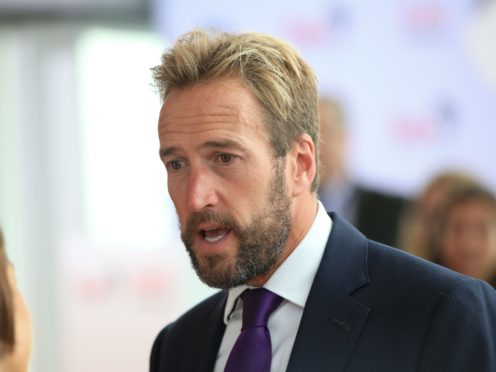TV presenter Ben Fogle has spoken of the “dark cloud” that was hanging over his head after climbing Mount Everest.
Fogle and Olympic champion Victoria Pendleton, along with mountaineer Kenton Cool, took on Everest earlier this year to highlight the environmental challenges mountains face.
Pendleton had to withdraw from the ascent of the 8,848 metres (29,029 ft) mountain on the Nepal/Tibet border after suffering from oxygen deprivation.
Fogle, 44, said that after returning home in May he lost all his motivation and felt immensely guilty that Pendleton had developed depression after pulling out of the climb.
“Victoria struggled with altitude sickness and very nearly died when we got back to camp two and made the heroic decision to abandon her summit bid and came back early,” Fogle said.
“She came back and struggled with depression. It was probably a collision of many different things… hypoxia, ill-health, disappointment. Many things came together.
“Here is an individual who I admire more than anyone else. She’s heroic, strong, both physically and mentally, and Kenton and I spent two years training with her and she’s an amazing athlete. Yet she succumbed to this depression.
“Coming back home and realising this affected me profoundly. I felt the guilt that perhaps I had helped push her into this situation in the first place.
“We had dreamt up this dream together, but I had kind of helped made it happen.
“In retrospect, I don’t think I would describe myself as having depression because I think that would be really unfair to those who really do suffer depression, I definitely had what I would call a bit of a dark cloud hanging over me.
“I am not a dark cloud kind of person, I am an optimist and I like to see greatness all around and there was this levering darkness and I couldn’t put my finger on it and I couldn’t concentrate.
“I was over-emotional and I lacked any sort of drive. I didn’t want to go to the gym or go for a run. I was trying to process things.
“Everest was a metaphor for life because for me, someone who lacked all this confidence.”
Fogle said he was lucky to complete the climb because on two occasions, while in the “Death Zone”, his oxygen regulator exploded and he had to borrow other people’s.
He said it was a childhood dream to climb Everest having become “mesmerised” by the “romance” of the mountain.
“From the age of about eight I had this idea that the ultimate human endeavour was to climb Everest,” he said.
“That was my benchmark of true grit and determination. It was always a pipe dream and never ever believed I would have the chance to do it and if I did I was pretty certain I would fail at it.”
Fogle has previously rowed the Atlantic, walked across Antarctica on foot, run the Sahara and crossed the Empty Quarter on camel.
Today @cheltlitfest | @KentonCool, @Benfogle and @bonitanorris discuss the fascination, danger and the impact of climbing Mount Everest at #cheltlitfest 🏔 https://t.co/5lBkBzwFMx pic.twitter.com/TtROcBdwHH
— Cheltenham Festivals (@cheltfestivals) October 12, 2018
“Kenton and I got to know one another and in the meantime I became a father and I woke up one day and thought ‘I’m telling my children to pursue their dreams and not to be held back by society’s expectations or by your own lack of confidence’ and here in the back of my mind was this burning desire to try Everest,” he said.
Fogle was speaking at the Cheltenham Literature Festival to promote his new book, Up: My Life’s Journey to the Top of Everest, which is published next week.
The Countryfile co-host said he was given four weeks to write the book, but really struggled and ended up writing it at the last minute inside three days.
“I said to my wife I can’t do it and she said, ‘No, you are not abandoning that book. You are not climbing to Everest and getting to the summit and being defeated by a book’,” Fogle said.
“We went away and I sat down and wrote the whole thing in three days.
“It just all came out. What was amazing was after those three days it was like my mind was completely clear again.
“This darkness that I couldn’t understand was gone and it is like it is all in that book. It was a very cathartic and therapeutic process.”
